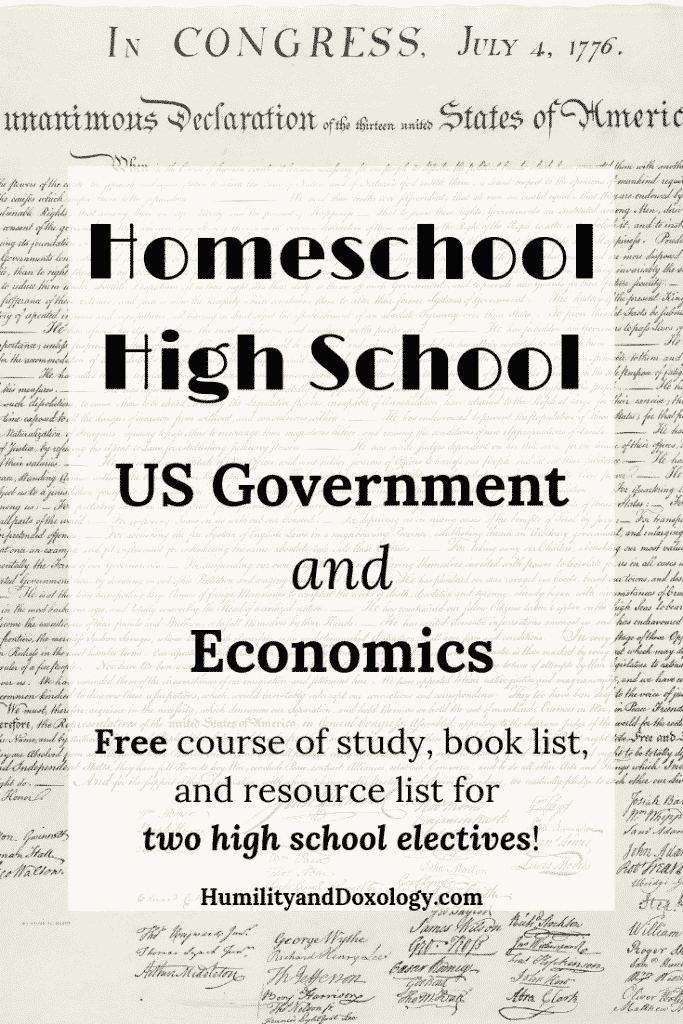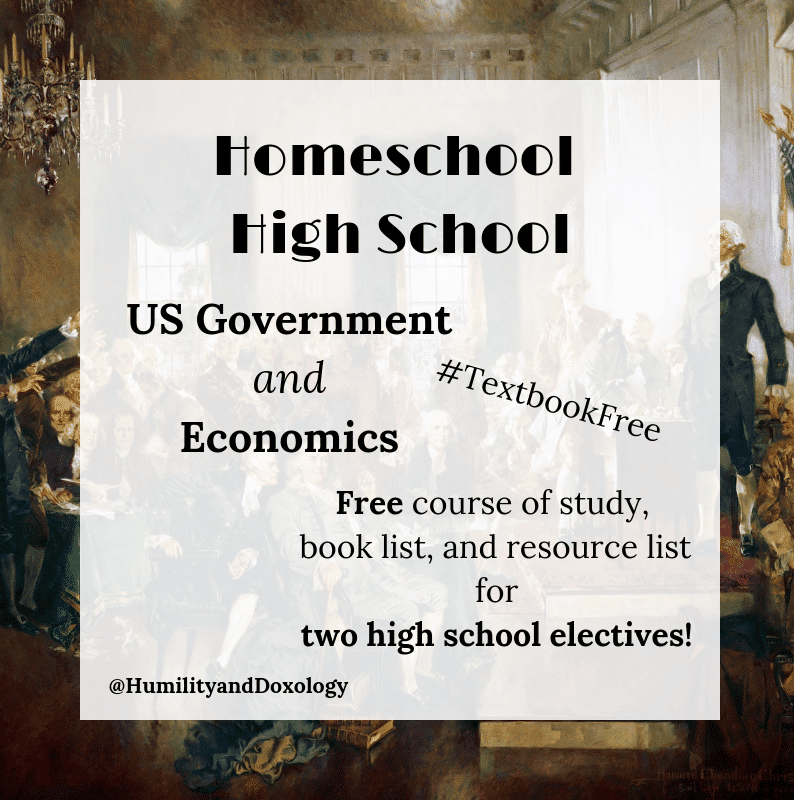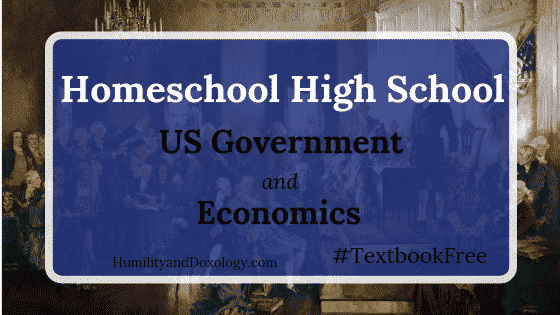Can you teach homeschool high school US Government and Economics courses at home? Can you teach them #TextbookFree?
Why Include Economics and US Government Courses in Our Homeschool High School?
One of the big picture questions I often ask myself when planning our course of study is “What kind of human do I want to raise?”. An important portion of that answer is that I want the adults who leave my home to understand their government, to appreciate and defend their rights and privileges as citizens, to comprehend how markets and money work, to care how government and economic policy affects not just them but also their neighbors, and to faithfully carry out their calling as Christian citizens.
Those goals, among others, are why I have decided to include both US Government and Economics as required courses in our homeschool high school curriculum.
{This post contains paid links. Please see disclaimer.}
When Will We Study US Government and Economics?
Because we homeschool, we have the privilege to set our own schedule and our own course of study. Customizing a homeschool high school curriculum plan is not something to be feared, but something to be relished. Our homeschooled high schoolers are not forced into an artificial order of subjects they must follow. Instead, we start with our end goals and work backwards to determine how to best fit those goals into our yearly schedules.
There is an extensive list of books and ideas I want my high school students to ponder in these areas of study, so I have chosen to spread these 2 courses out over their entire high school career. The total work will easily add up to 2 course credits, but spreading it out keeps the information-overwhelm at bay.
Because many of the books we will be studying include topics that have implications for both US Government and Economics courses, I have created one curriculum list that will end up covering both topics thoroughly. Because we’re studying these courses #TextbookFree, it felt too artificial to divide them neatly into two separate lists.
It would probably be much easier to just get regular textbooks, fill out some workbooks, and pass some tests. But I truly believe the books we read and discussions we will be having in the years ahead will be incredibly valuable and worth our extra effort!
Related: How To Create Your Own Homeschool High School Curriculum

Questions and Ideas To Be Explored in our High School US Government and Economics Curriculum:
- What is government? What is the basis of authority? Are there different spheres of authority and, if so, what are they?
- What are the history and foundations of US government?
- What important documents help us understand the formation and continuing work of the US government? {Special attention given to the US Constitution: outline and summarize the articles and amendments}
- What are the branches of the federal government, their roles, and functions?
- How does the political system work at the state and federal level?
- What are the central beliefs of the various political ideologies?
- What are the central freedoms, rights, and issues in the US Government today and in the past? {Read and summarize specific, pivotal Supreme Court cases}
- How does the US Government system compare/contrast with other international political systems?
- What are the primary economic philosophies? Explore economic topics/controversies in the context both of history and contemporary debates.
- What are the central elements at play in macroeconomics?
- What are the central elements at play in microeconomics?
- What are the central elements at play in personal finance?
- What current governmental and economic questions face the domestic and international community?
- How is a Christian to view their calling as citizen?
- How is a Christian to consider economic issues of money/poverty/industry/etc?
US Government Documents to Read, Summarize, and Discuss:
- Mayflower Compact
- Fundamental Orders of Connecticut
- Declaration of Independence
- Articles of Confederation
- Constitution
- Federalist Papers and Anti-Federalist Papers (selections)
- Selected Supreme Court Decisions {be able to summarize each decision and its place in American legal history; available at the Library of Congress}:
- Marbury v. Madison
- Youngstown Sheet and Tube Co. v. Sawyer
- McDaniel v. Paty
- Ware v. Hylon
- Dred Scot v. Sandford
- Plessy v. Ferguson
- Brown v. Board of Education
- Times v. Sullivan
- Roe v. Wade
- People v. DeJonge

US Government and Economics Books and Lectures
Top priorities are in bold; the others we will explore as we have time/interest:
- Roots of American Order, Russell Kirk
- Economics in One Lesson, Henry Hazlitt
- The Law, Frederic Bastiat
- Student’s Guide to American Political Thought (ISI), George Carey
- In the Shadow of Plenty, George Grant
- Whatever Happened to Penny Candy, Richard Maybury
- Decision in Philadelphia, Christopher Collier
- I, Pencil, Lawrence Read
- American Legal Experience (Modern Scholar lecture series), Lawrence Friedman
- History of American Law, and other books by Lawrence Friedman
- The Wealth of Nations, Adam Smith
- Lex Rex, Samuel Rutherford
- The Travels of a T-Shirt in the Global Economy, Pietra Rivoli
- Common Sense, Thomas Paine
- The Communist Manifesto, Karl Marx and Friedrich Engles
- Leviathan, Thomas Hobbes
- Social Justice, Calvin Beisner
- Second Treatise of Government, John Locke
- Rendering Unto Caesar, Lawrence Reed
- An Experiment in Liberty, George Grant








































Supplemental Resources: Podcasts, Films, and YouTube
- Words and Numbers
- Planet Money
- FEECast
- StandfastCast
- Freakonomics
- HeadLocke
- 12 Angry Men
- Crash Course American Government and Politics
- Crash Course Economics
Other Supplemental Resources Available for Homeschool High School Government and Economics
- The Library of Economics and Liberty (High School Economics Topics)
- Free online courses from Hillsdale College
- Senate Page/Governor’s Page programs
- Local community/government volunteering
- National Constitution Center Interaction Constitution
- The American Constitution – A Documentary Record
- CLEP Exams
- Study Guides for the CLEP exams (Government, Microeconomics, and Macroeconomics)

Are you homeschooling high school? If so, do you plan to study US Government and/or Economics? Do you think I’ve left off any essential readings for my students? I hope this curriculum plan is a blessing to your family as well…let me know if you decide to use any of the resources I shared!
Don’t forget to sign up for my email list for subscriber exclusives!
**Painting: Signing of the Constitution, Howard Chandler Christy
Image of Declaration of Independence from the National Archives









Pingback: Why Bother? What’s the point of a great education if your children can’t seem to remember most of it? – Humility and Doxology
Amy,
This looks great! I may be stealing some of this for my current 9th grader!
Question – you have more experience than I since I believe that both you and your husband were homeschooled. I see that you have CLEP test prep on here. I have heard mixed reviews of CLEP testing. We have had our oldest (rising senior) take AP exams, but honestly, I didn’t know that much about them until the end of his sophomore year, so we haven’t done as much with those as we could have. I have heard that some universities snub their noses at CLEP, so I’m curious as to what you’re planning to do with them or what you and your husband have used them for yourselves in the past?
Thanks for reading!
I can only speak to my own experience. I encourage people to check with the universities they are considering to see what is accepted or not. For instance, I went on the websites of 3 representative colleges and universities my children might consider (1 state university, 1 community college, 1 private college). Each of those websites has a list of the various tests they accept and what credit will be given for them. I’m not having my kids take random CLEP exams; they’re taking ones that will most likely be accepted at these schools. With a CLEP exam, you literally get credit on your college transcript as having taken that course; it counts towards your total hour requirement. You aren’t just placed into a higher level course. I personally took 6 CLEP exams which essentially got me out of an entire semester’s worth of work (which was quite useful since I was pregnant and then nursing my 3rd baby at the time). 😉 Also, remember you never *have* to submit the CLEP exams, so if you’re applying to an elite private school that won’t accept CLEP as worth anything, then just don’t submit the scores with that application. My thought with CLEP has always been we might as well take the tests while the information is fresh so we have the freedom and flexibility later on. It won’t hurt anything if they end up not being used, but on the flip side it could be a huge benefit! They’re limited time commitment, limited financial commitment, and you can’t get much easier than multiple-choice tests. 🙂 I’m not saying they’re a sign of a great education, but if these are some simple hoops we can jump thru, it seems like a worthwhile investment of time and money to me. It is also a completely personal decision!! I hope that is helpful. 🙂
Wow, such a great vault of resources! I’ve always been afraid of building my own curriculum, but I see now how possible it is, and this is enough to set anyone’s mind at ease about “covering” the material that would be in a pre-packaged curriculum. Good stuff!
Thank you! 🙂 Maybe it’s that 2nd-generation homeschooler rebel streak coming out, but I do so love customizing our curriculum. 🙂
Do you have some kind of schedule?
We are spreading it out across 4 years of high school. I assign a certain number of books/Supreme court decisions to be read and discussed each year. You can read a bit about how I plan our homeschool here.
Is it possible to do this in a year if it is more focused?
I think you could definitely make this work in a year, you would just pick a more focused/limited book list. Instead of 2 full credits, you could also consider having 1/2 credit for Government and 1/2 credit for Economics. You could focus on one in the fall semester, one in the spring.
Hi Amy!
How do you determine a grade (for transcripts) for a course like this?
Do you assign any essays along the way?
In order to have meaningful discussions, I assume you do the reading as well, correct?
Thanks!
Cheryl
Great questions! My son actually took the US Government CLEP exam and passed it, so I counted that as an “A” for his transcript. I had no problem giving him an A for a high school course considering he will also get full college credit having passed that exam. He plans to take the economics CLEP exam, too. So because I knew he planned to do those 2 things, I focused more on the content of his reading and our discussions without worrying about creating a grading scale. However, this will not work for all of my kids probably, and I’ll have to create some sort of grading rubric so decide how I’m going to evaluate their work. Heather Woodie has some great resources for outside-the-box approaches to high school.
I have not assigned essays, although he has written reading journal entries based on what he has read.
I am also very fortunate because many of these books I had previously read, so I have not necessarily kept up with all the reading along the way. I remember enough at least to ask good questions. 😉 If I were new to all the material, I would definitely still not try to keep up with all his reading. I might choose a couple titles a year to read on my own in order to facilitate better discussion.
I love your homeschooling style. I am struggling with my son’s schooling and feel as though he is not getting much from our work. He is in 9th grade. What topic and or book do you start with in this subject area?
Hi Jessica. Thanks for your question! Do you mean specifically when it comes to US Government/Economics, or more 9th grade curriculum in general? Are you asking for a book to help you as mom, or a good book to jumpstart your son’s enthusiasm for learning? If you’re asking for a good book to start with in the particular government/economics area, at your son’s age I’d suggest starting with Whatever Happened to Penny Candy and Decision in Philadelphia.